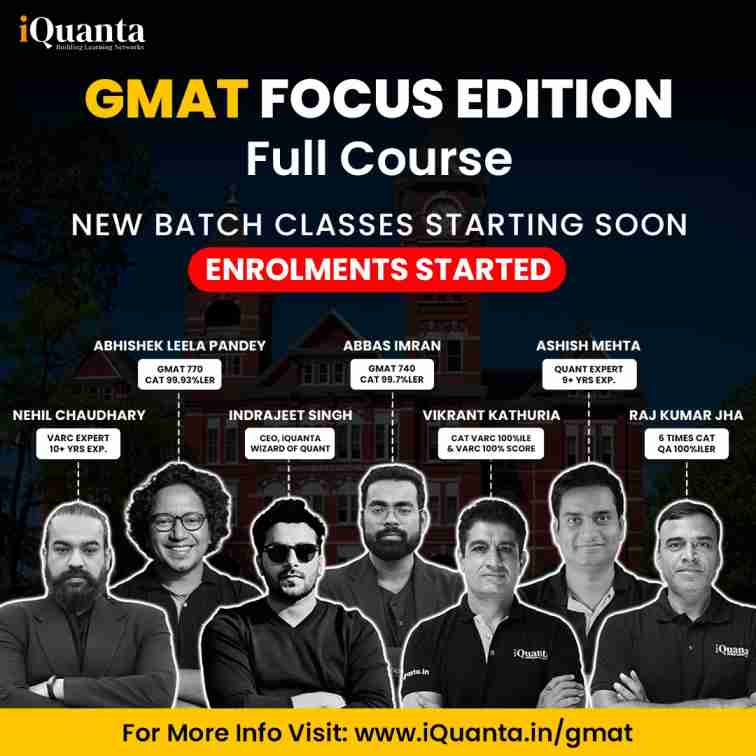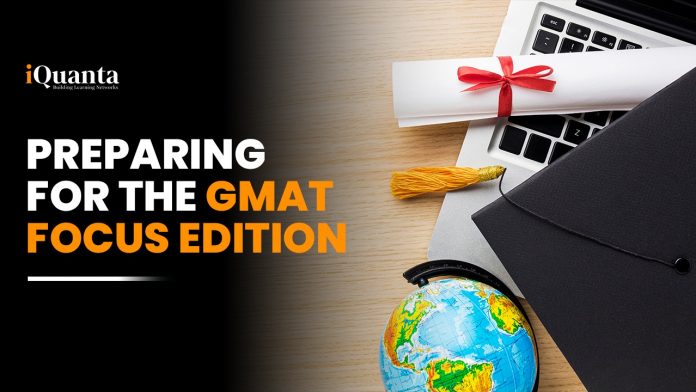Preparing for the Graduate Management Admission Test (GMAT) is a crucial step for many of us aspiring to attend business school. Success on the GMAT doesn’t just happen by chance; it requires a well-structured preparation strategy that encompasses understanding the test format, mastering the content, practicing test-taking strategies, and maintaining a positive and calm mindset. In this article, we’ll dive into how to effectively prepare for the GMAT: Focus Edition, so that we can approach the exam with confidence and competence.
Understanding the GMAT Focus Edition
Firstly, let’s understand what the GMAT entails. This exam is designed to assess the skills most relevant to success in business and management realms. It comprises four main sections: Data Insights, Quantitative, and Verbal. Each section tests specific abilities:
| New GMAT Sections | No of Questions | Question types | Section duration |
| Verbal Reasoning | 23 | Reading Comprehension, | 45 minutes |
| Critical Reasoning | |||
| Quantitative Reasoning | 21 | Problem Solving, | 45 minutes |
| Algebra and Arithmetic | |||
| Data Insights | 20 | Data Sufficiency; | 45 minutes |
| Multi-source Reasoning; | |||
| Table Analysis; | |||
| Graphics Interpretation; | |||
| Two-Part Analysis |
- Data Insights: Our data interpretation skills are tested in this section.
- Quantitative: Our problem-solving skills and understanding of basic mathematical concepts.
- Verbal: Our reading comprehension, critical reasoning, and sentence correction skills.
Unlike Classic GMAT, in GMAT Focus Edition, all the sections are equally weighted. Understanding the structure and scoring of each section is the first step in our preparation journey. The GMAT is a computer-adaptive test, meaning the difficulty of questions adjusts based on our performance. Familiarizing ourselves with this format will help us strategize our approach during the exam.
Understanding the difference between Classic GMAT and GMAT Focus Edition
While many of us are tend to confuse the differences between these two editions, it is essential to understand before we prepare and attempt. Here is the list of difference that you should be aware of:
Enroll for GMAT Online Coaching by iQuanta
| Parameters | GMAT Focus Edition | Classic GMAT Version |
| Acceptance | Accepted by over 7,700+ programs at more than 2,400 business schools. | |
| Structure | 3 sections & 64 questions Quantitative Reasoning Verbal Reasoning Data Insights | 4 sections & 80 questions Quantitative Reasoning Verbal Reasoning Integrated Reasoning Analytical Writing |
| Duration | 2 hours 15 minutes | 3 hours 7 minutes |
| Review & Edit | Bookmark and review as many of your answers as you want, and one can change up to 3 responses per section. | Not applicable. |
| Total Score Scale | 205-805 | 200-800 |
| All 3 sections are weighted equally towards the total score. | Only 2 sections, Quantitative Reasoning and Verbal Reasoning are weighted equally towards the total score. | |
| Score Sending | Send 5 free score reports to programs within 48 hours of receiving your Official Score Report. Additional score reports are available for a fee. | Test Center: Select up to 5 programs before your exam to receive your Official Score Report at no charge. |
| Online: Send 5 free score reports to programs within 48 hours of receiving your Official Score Report. | ||
| Additional score reports are available for an additional fee. | ||
| Cost | USD 300 (online) and USD 275 (at a test centre) | Fees are based on location and channel (online or test centre) but range from USD 413 |
Setting a Baseline and Goals
Before diving into preparation, it’s important to take a diagnostic test to establish our baseline score. This will highlight our strengths and weaknesses, providing a clear starting point. With this information, we can set a realistic target score based on the requirements of our desired business schools. Our goal should be challenging yet attainable, motivating us to put in consistent effort.
Additionally, by understanding our baseline, we can better gauge the amount of preparation time needed. For instance, if our initial score is close to our target, we might need less time to prepare than someone whose baseline score is significantly lower. Recognizing this difference helps us create a tailored study plan that suits our individual needs.
Creating a Study Plan
A well-structured study plan is crucial for effective preparation. We should allocate a specific number of hours per week to study, aiming for consistent daily practice rather than cramming. A typical preparation timeline ranges from three to six months, depending on our baseline score and target.
Weekly Study Schedule: Divide our study time into manageable blocks, focusing on different sections each day. For example:
- Monday: Quantitative
- Tuesday: Verbal
- Wednesday: Data Insights
- Thursday: Revision of all the sections
- Friday: Review and practice tests
- Saturday: Focus on weak areas
- Sunday: Rest or light review
By structuring our week this way, we ensure a balanced approach that covers all sections of the exam. Furthermore, we prevent burnout by incorporating rest and lighter review days into our schedule.
Daily Study Sessions: Break down our daily study sessions into focused intervals, such as 45 minutes of study followed by a 15-minute break. This method, known as the Pomodoro Technique, enhances concentration and prevents burnout. Incorporating breaks is essential for maintaining long-term productivity and avoiding mental fatigue.
Mastering the Content
Data Insights
The section assesses your proficiency in interpreting and analyzing various forms of data which are essential skills in the data-heavy landscape of modern business. By mirroring the rise of data-centric roles in industry and the emphasis on data-intensive subjects in business schools, this section ensures GMAT aligns with contemporary business requirements. Thus, mastering this section is crucial for candidates to distinguish themselves and demonstrate their preparedness for data-driven business education and career.
Quantitative Section
The Quantitative section assesses our mathematical skills and problem-solving abilities. To excel:
- Review Fundamentals: Ensure a strong grasp of basic math concepts such as arithmetic, algebra, geometry, and number properties.
- Practice Problem-Solving: Solve a variety of practice problems to build our skills. Focus on understanding the underlying concepts rather than just memorizing formulas.
- Learn Shortcuts and Strategies: Develop strategies for tackling different types of questions efficiently. Practice time management to ensure we can complete all questions within the time limit.
Additionally, we should focus on identifying the types of quantitative questions that we find most challenging and prioritize practicing those. This targeted approach will help us improve our weakest areas more effectively.
Verbal Section
The Verbal section evaluates our ability to read and understand written material, evaluate arguments, and correct written English. To master this section:
- Read Regularly: Improve our reading comprehension skills by reading diverse materials such as newspapers, journals, and business publications.
- Practice Critical Reasoning: Work on identifying assumptions, strengthening or weakening arguments, and drawing logical conclusions.
- Study Grammar Rules: Review grammar rules and practice sentence correction to improve our accuracy.
In addition to practicing individual questions, we should also focus on full-length verbal sections to build stamina and improve our ability to maintain accuracy under timed conditions.
Practice and Review
Regular practice is essential for success on the GMAT. Mock tests form an essential part of any competitive examination. We should be consider taking mocks at regular intervals to understand where we stand in the crowd and how to strategize going forward. Mocks pictures the actual test scenario and sitting straight for all the sections at once build endurance for our D-day. It is also equally important for us to analyze our mocks once. Going through every question and analyzing strengths and weaknesses is something one should be focused on to actually improve and perform their best on the actual test day. Therefore, after each mock test:
- Analyze Our Performance: Review our answers, especially the incorrect ones. Understand why we made mistakes and how to avoid them in the future.
- Track Our Progress: Keep a record of our scores and identify patterns in our performance. Focus on improving our weak areas.
- Adjust Our Study Plan: Based on our progress, adjust the study plan to allocate more time to sections that need improvement.
Moreover, by tracking our performance over time, we can identify trends in our scores and make more informed decisions about where to focus our efforts. For instance, if we notice consistent improvement in one area but stagnation in another, we can shift our study time accordingly.
Test-Taking Strategies
Developing effective test-taking strategies is crucial for maximizing our score. Here are some tips:
- Time Management: Practice pacing ourselves to ensure we can complete each section within the allotted time. Use a timer during practice sessions to simulate test conditions.
- Answer Every Question: Since the GMAT is computer-adaptive, it’s better to guess than to leave a question unanswered. Educated guesses can increase our chances of getting a correct answer.
- Stay Calm and Focused: During the test, stay calm and focused. If we encounter a difficult question, don’t dwell on it. Move on and come back if we have time.
Another important strategy is to become familiar with the test interface. Knowing how to navigate the test efficiently can save valuable time during the actual exam.
Maintaining a Positive Mindset
Preparing for the GMAT can be stressful, but maintaining a positive mindset is essential for success. Here are some strategies to stay motivated and focused:
- Set Realistic Expectations: Understand that improvement takes time. Celebrate small victories and progress along the way.
- Stay Healthy: Prioritize our physical and mental health. Get enough sleep, eat well, and exercise regularly to keep our mind and body in optimal condition.
- Seek Support: Join study groups or forums to share experiences and tips with other test-takers. Support from peers can keep us motivated and provide valuable insights.
Additionally, incorporating relaxation techniques such as mindfulness or meditation into our routine can help reduce stress and improve focus.
Resources for GMAT Preparation
Utilizing a variety of resources can enhance our preparation. Here are some recommended resources:
- Official GMAT Prep Materials: Use official GMAT guides and practice tests from the Graduate Management Admission Council (GMAC).
- Online Courses: Enroll in online courses from reputable test prep institutions like iQuanta. They have tailored programs depending on your target and level of competence and have proven track record of students scoring 720+. These courses offer structured lessons, practice questions, and personalized feedback.
In addition to these resources, consider joining online forums such as GMAT Club or Reddit’s GMAT community. These platforms offer a wealth of shared experiences, study tips, and motivational support from fellow test-takers.
Final Preparations
As our test date approaches, make final preparations to ensure we’re ready:
- Simulate Test Conditions: Take full-length practice tests under realistic conditions. This helps build endurance and familiarity with the test format.
- Review Key Concepts: In the final weeks, focus on reviewing key concepts and strategies rather than learning new material.
- Plan Test Day Logistics: Familiarize ourselves with the test center location, plan our travel, and gather necessary identification and materials.
Additionally, it’s helpful to do a dry run to the test center to eliminate any uncertainties about the location and travel time. This reduces stress on the actual test day.
Conclusion
In conclusion, preparing for the GMAT requires a comprehensive and disciplined approach. By understanding the test format, setting realistic goals, creating a structured study plan, mastering the content, practicing regularly, and maintaining a positive mindset, we can maximize our chances of achieving a high score. Remember that consistent effort and strategic preparation are the keys to success. With dedication and perseverance, we can approach the GMAT with confidence and secure a score that opens doors to our desired business school.






